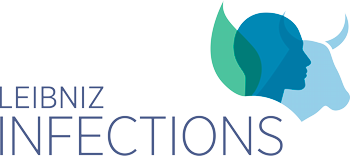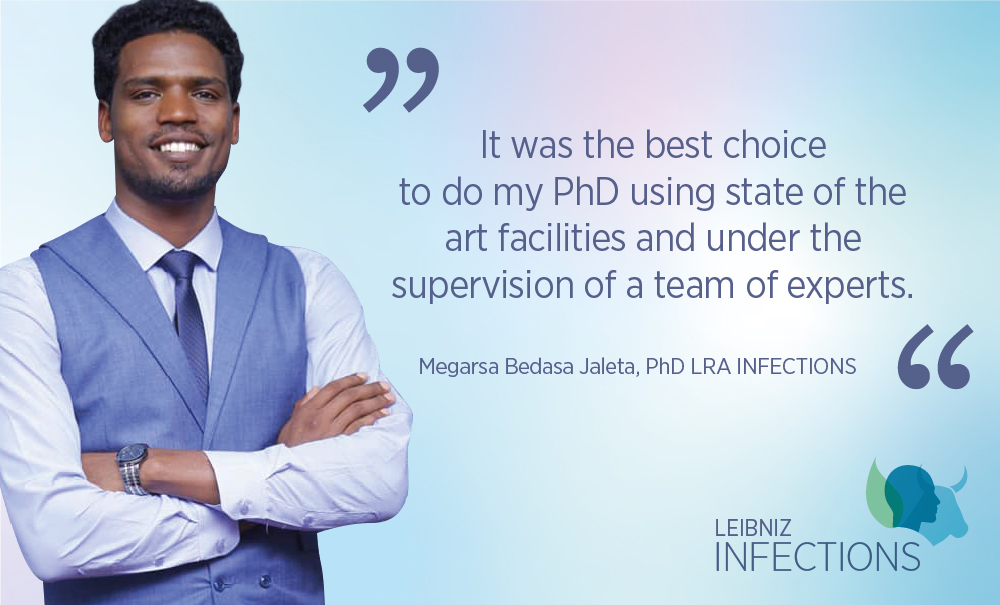This week we introduce the PhD student of IPT5: Megarsa Bedasa Jaleta, Veterinarian and Veterinary Epidemiologist .
Within the framework of his project "AMR spread in animal husbandry- mechanisms and possible interventions", Megarsa is comparing the occurrence of AMR in pigs under different hygienic conditions and when different feed additives are administered. Based on these results, potential strategies to control the spread of AMR in livestock breeding will be defined in close collaboration with the other IPTs, thus reducing the potential contamination of the environment.
Profile Megarsa Bedasa Jaleta
Name: Megarsa Bedasa Jaleta
Age: 31
Where and what have you studied?
Doctor of Veterinary Medicine (Sept 2009 to July 2015); Master of Veterinary Epidemiology (Sept 2017 to July 2019). Both at Addis Ababa University, Ethiopia.
Which field of research interests you the most?
Infectious diseases
One Health
Zoonotic diseases
Vector borne diseases
Why did you apply to the Leibniz Research Alliance INFECTIONS?
My top interest in LRA INFECTIONS is in line with my curiosity and experiences. I have also the ambition to work with people from different fields of studies, for which LRA INFECTIONS has the approach of interdisciplinary. Moreover, it was my best choice that I have wanted to do my PhD using state of the art facilities and under the supervision of a team of experts. LRA INFECTIONS partners and networks are hubs of robust research facilities and renowned professors and scientists. Through networking associated with projects, I expect I will get a chance to know many people, gain a lot of skills and knowledge, and these are very helpful for my future career. Last, not least, I like a sort of international spirit within LRA that through working with people of different social and geographic, I hope will get the opportunity to learn a different language, culture, and lifestyle.
Describe your research project briefly and in a generally understandable way:
The ATB is a member of the LRA INFECTION. This research network aims to use interdisciplinary research and communication to develop new strategies and methods for early warning systems, improved outbreak management and optimized containment of antimicrobial resistant pathogens. The One Health approach is central and takes into account the interaction between humans, animals and the environment. All research is performed as multidisciplinary, cooperative projects of several partner institutes. In Interdisciplinary Project Team 5 (IPT5), ATB together with the DSMZ (Braunschweig), the ZALF (Müncheberg), the IPHT (Jena), the HKI (Jena) and the TZR (FU Berlin), mechanisms and transmission routes influencing AMR spread in fattening pig husbandries will be investigated. Specifically, ATB we will compare AMR occurrence of pigs grown in a standard and improved hygienic environment (insecticides, flytraps, increased dis-infection, dusting etc.). Definition and implementation of the higher hygiene status will be realized together with the Veterinary Center for Resistance Research (VCR2). Antibacterial activities of different feed additives will be compared to basic rations based on microbial colonization and successions in the gut of piglets during the fattening period. In close cooperation with the Leibniz associations and partners in the project networks, the survival and propagation of AMR microbes in pig faeces, dust and flies under all conditions will be monitored. The abundance of antibiotic resistance based on bacteriological methods and cultivation-independent DNA sequencing will be conducted at DSMZ. With support from other sister projects, the findings will guide interventions and potential mitigation strategies to minimize AMR spread in commercial animal husbandry to reduce potential contamination of surface water when the slurry is used as organic fertilizer.
What do you think will be the biggest challenges but also the biggest opportunities during your work?
The possible challenges may be:
Current COVID-19 pandemic situations
Ethical issues associated with the addition of feed additives to animal feed
Some problems associated with difficulty in experimental control that related to the nature of the farm building and biosecurity
Limited spaces (pens and barns) available experimental replications
Opportunities:
Full funded project for PhD work
Access to well-equipped laboratories for sample analyses
Learning many professional skills and knowledge
Working with robust teams
Big chance to participate in different scientific forums and media outlets
Thanks for the interview. We are happy to have you on board!


